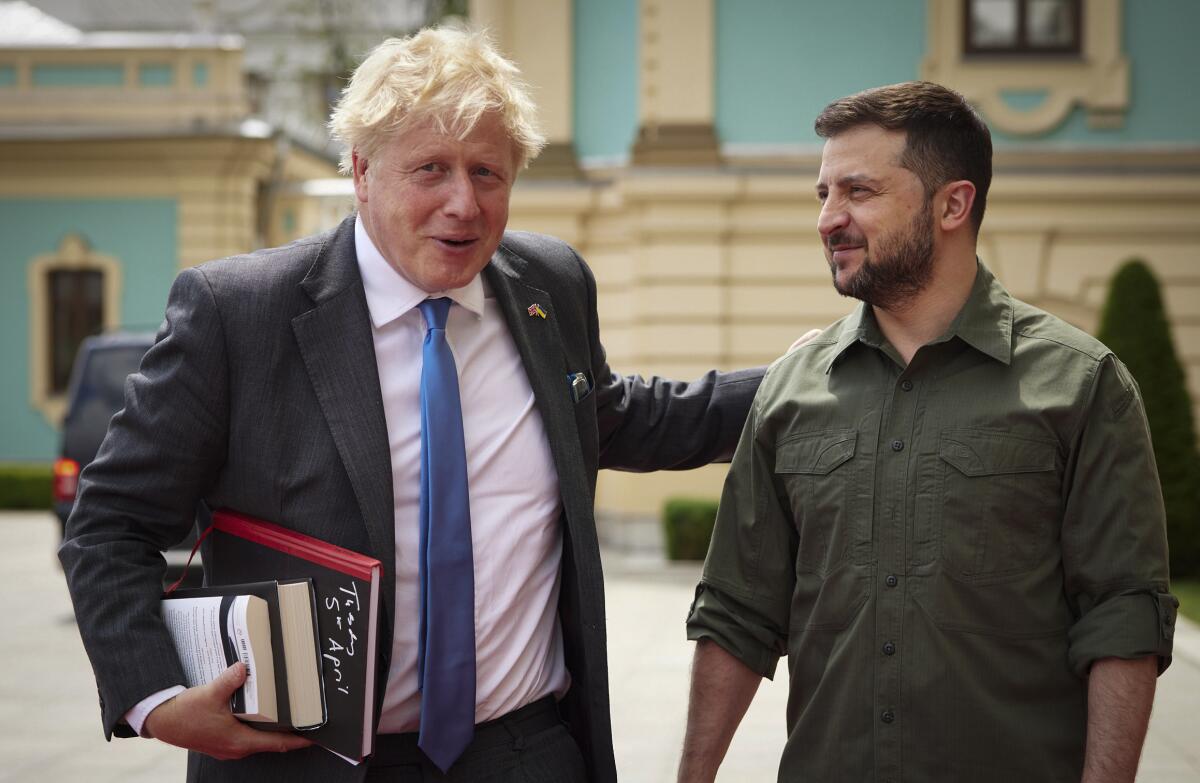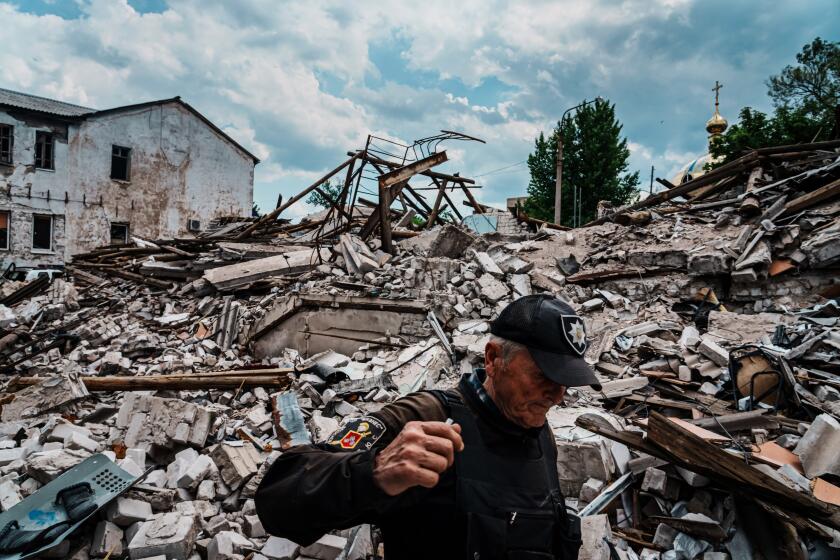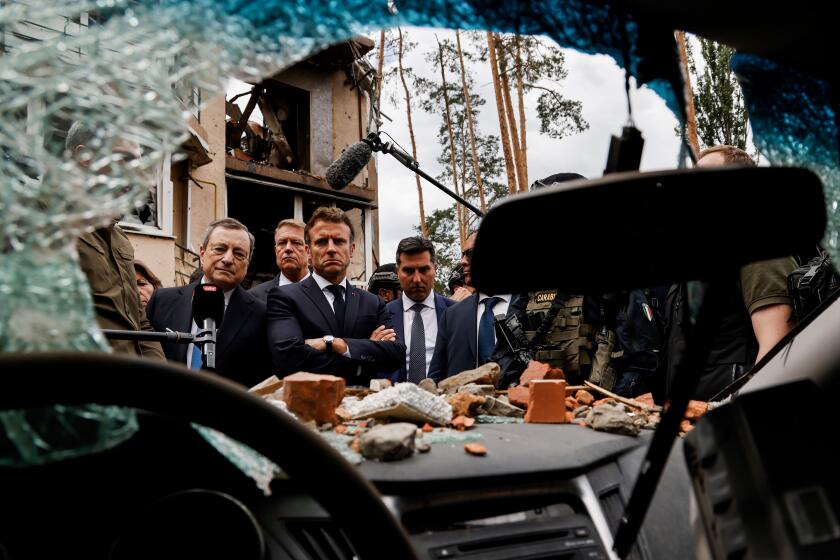Ukraine gets possible path to EU and aid pledges from Britain

- Share via
KYIV, Ukraine — The European Union’s executive arm recommended putting Ukraine on a path to membership Friday, a symbolic boost for a country fending off a Russian onslaught that is killing civilians, flattening cities and threatening its very survival.
In another show of Western support, British Prime Minister Boris Johnson met with President Volodymyr Zelensky in Kyiv to offer continued aid and military training.
The European allies’ latest embrace of Ukraine marked another setback for Russian President Vladimir Putin, who launched his war nearly four months ago, hoping to pull his ex-Soviet neighbor away from the West and back into Russia’s sphere of influence.
At Russia’s showpiece economic forum in St. Petersburg on Friday, Putin said Moscow “has nothing against” Ukraine joining the European Union because it “isn’t a military organization, a political organization like NATO.” He also reprised his usual defense of the war, alleging it was necessary to protect people in parts of eastern Ukraine controlled by Moscow-backed rebels and to ensure Russia’s own security.
Johnson’s trip to Kyiv followed one Thursday by the leaders of Germany, France, Italy and Romania, who pledged to support Ukraine without asking it to make any territorial concessions to Russia.
“We are with you to give you the strategic endurance that you will need,” Johnson said on his second visit to the country since the Feb. 24 start of the war. Although he did not detail the aid, he said Britain would lead a program that could train up to 10,000 Ukrainian soldiers every 120 days in an unspecified location outside the country.
The training program could “change the equation of this war,” he said. Ukraine has been taking heavy casualties in fighting in the east.
Ukraine is in a brutal artillery war, the kind not seen since World War I. Lacking better weapons, it is losing as many as 6,000 soldiers a month.
“I completely understand why you and your people can make no compromise with Putin because if Ukraine is suffering, if the Ukrainian troops are suffering, then I have to tell you that all the evidence is that Putin’s troops are under acute pressure themselves and they are taking heavy casualties,” he said. “Their expenditure of munitions, of shells and other weaponry, is colossal.”
Since his April visit, “the Ukrainian grit, determination and resilience is stronger than ever, and I know that unbreakable resolve will long outlive the vain ambitions of President Putin,” he said.
Johnson said the U.K. will work to intensify the sanctions on Russia. He praised the resilience of Ukrainians and how “life is coming back to the streets” of Kyiv, but noted that “only a couple of hours away, a barbaric assault continues. Towns and villages are being reduced to rubble.”
Zelensky gave Johnson a tour of a monastery where they lit candles and the British leader received an icon. They placed flowers at an outdoor memorial wall displaying photos of soldiers who fell in fighting in 2014, viewed an exhibit of damaged, rusting Russian weapons, and greeted cheering crowds.
“We have a common view of the movement toward Ukraine’s victory. I’m grateful for the powerful support!” Zelensky said on Telegram.
The possibility of membership in the EU, created to safeguard peace on the continent and serve as a model for the rule of law and prosperity, fulfills a wish of Zelensky and his Western-looking citizens.
The European Commission’s recommendation that Ukraine become a candidate for membership will be discussed by leaders of the 27-nation bloc next week in Brussels. The war has increased pressure on EU governments to fast-track Ukraine’s candidacy, but the process is expected to take years, and EU members remain divided over how quickly and fully to welcome new members.
The leaders of France, Germany and Italy travel to Kyiv to show their support for Ukraine, though some critics say Europe is not doing enough.
Political and military support from Western countries has been key to Ukraine’s surprising success against larger and better-equipped Russian forces. Zelensky has also clamored for additional immediate support in the form of more and better weapons to turn the tide in the industrial east, known as the Donbas region.
In St. Petersburg, Putin decried the sanctions imposed on Russia by the U.S. and its allies as “insane and, I would say, reckless.”
“The calculation was understandable: to impudently, with a swoop, crush the Russian economy by destroying business chains, forcing the withdrawal of Western companies from the Russian market, freezing domestic assets, hitting industry, finance and the people’s standard of living. It didn’t work,” he said.
Russia has pressed its offensive in the east, leaving desperate residents worried about their future.
“We are old people. We do not have a place to go. Where will I go?” asked Vira Miedientseva, an elderly resident grappling with the aftermath of an attack Thursday in Lysychansk, just across the river from Severodonetsk, where a key battle is raging.
More to Read
Sign up for Essential California
The most important California stories and recommendations in your inbox every morning.
You may occasionally receive promotional content from the Los Angeles Times.












